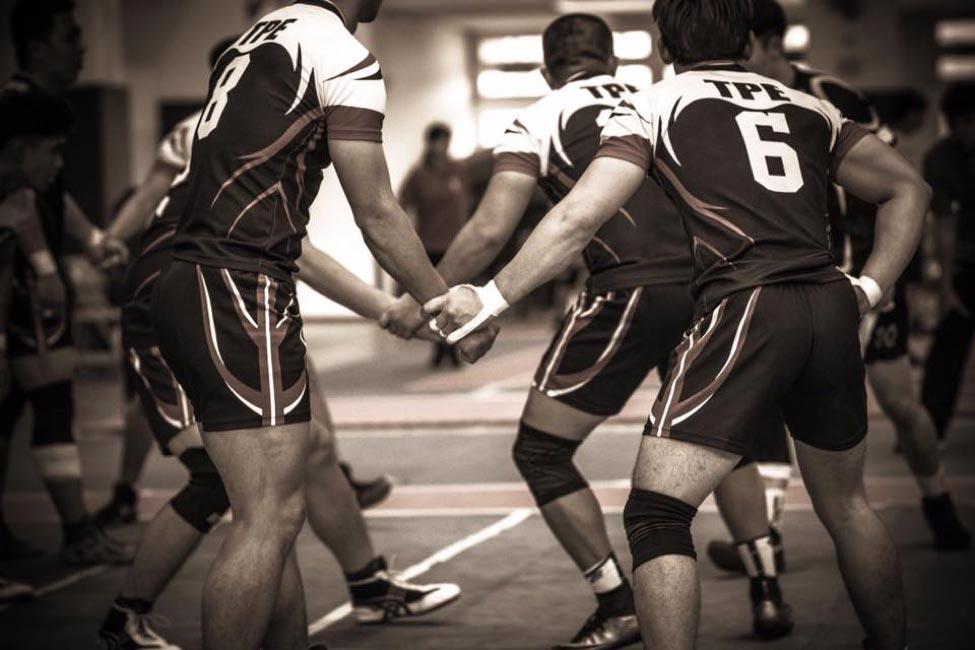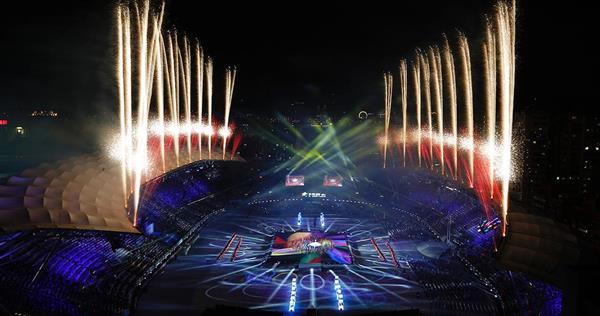
運動星球
牽起手腕,牽動情誼的運動──「卡巴迪」
2017-09-20
「卡巴迪」是一項源於南亞地區、觸碰性的競賽運動,引進臺灣之後,近年發展迅速,縱然如此,卡巴迪在臺灣仍屬沒有太多人知道的小眾運動,而且,因為缺乏政府單位的支持和運作,這項運動在臺灣還是停留在閉門造車的階段,縱使已經產生一些本土優秀選手,也沒有太多機會能夠參與國際賽事,讓臺灣在這方面也有可能成為強項國家,實屬可惜。
這種特殊的競技運動,團隊合作的競賽方式讓它對於成員的情感聯繫有著強力的黏合作用,類似老鷹抓小雞的進行方式,令人也有種似曾相似的熟悉感。究竟它有沒有可能在臺灣發展成為顯學?以下是一位學者的現場觀察:
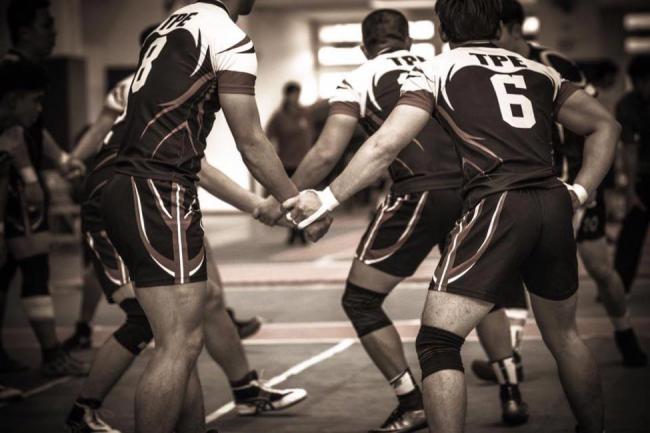
卡巴迪起源印度,在台灣已有超過10年發展。 圖片提供/Aron Chen
「本土」訓練
「2008 年我第一次參加卡巴迪亞青盃,那時候我根本不知道什麼是卡巴迪,教練只給了我們一隻 DVD,內容是杜哈亞運的卡巴迪比賽片段,然後,便叫我們從中學習……我們的同組對手是馬來西亞、巴基斯坦和伊朗,結果,我們分別大敗 60:3、40:20 及 80:20……賽事結束後,一些隊友決定放棄這個運動,但我對自己說,從那裡倒下,便從那裡站起來,之後,我就自己不斷看片,研究卡巴迪究竟是怎麼一回事……」
威暘是臺灣第一代的卡巴迪選手,2017 年 6 月,我跟隨他到花蓮,參與當地一間中學所舉辦的卡巴迪訓練營,在回程到臺北的路上,他跟我分享他的卡巴迪歷程。
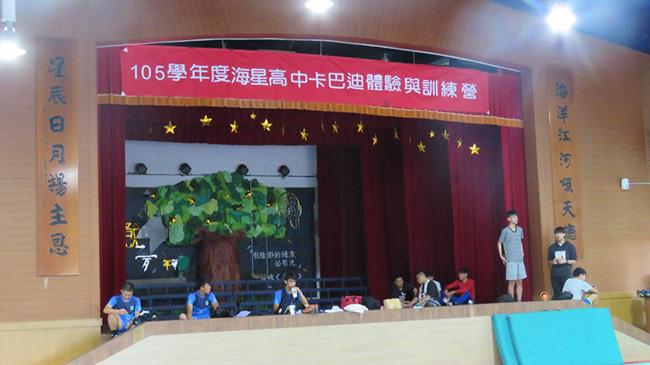
花蓮一間中學為國中和高中生舉辦卡巴迪體驗與訓練營。
不同地區有不同的發展模式
他說,不同地方發展卡巴迪有不同模式,如日本,他們每一至兩年便會到印度卡爾各答進行集訓,增進技術,相比之下,臺灣的發展則較為「本土」,既沒有出外集訓,也沒有從南亞請教練過來指導,一切只從影片和書本中學習。
威暘說,起初訓練方面相當困難,但後來隨著網路的普及,網路上能找到更多的資料和影片,這大大改進他們的技術,同時,這樣的發展模式之下,避免了「教練一言堂」的文化。佳銘和威暘同屬臺北市立大學卡巴迪隊的隊員,佳銘是隊伍的前隊長,他跟我解釋他們的訓練模式:
「臺灣沒有專業的卡巴迪教練,當我們練習的時候,我們每人會輪流擔當教練的角色,首先觀察自己隊伍的強弱之處,然後自己上網找資料,作出針對性的訓練。」
過去有很多文獻討論臺灣國民政府如何透過體育運動貫輸「儒家文化」,桎梏臺灣的體育發展(例:Chiang et al. 2015; Yu and Bairner 2011),但從臺灣卡巴迪的例子來看,訓練模式以運動員為中心 (player-centered approach),每個成員都需要徹頭徹尾的參與,這使大部份的運動員除了善於作賽外,也善於觀察、帶領、教導和分析賽事,給運動員一個較全面的發展。
時不予臺灣
2014 年,威暘有機會到印度參與 PKL 的賽事,共參與了第一季和第三季的賽事,另一位卡巴迪運動員佳偉,於 2016 年也參與了 PKL,並參與了第三季和第四季的賽事。隨著這些國際賽的經驗增加,臺灣卡巴迪隊的實力也得到提昇,但男子隊苦無機會走上國際舞台,威暘告訴我:
「2008 年,我們全沒準備之下參與國際性比賽,結果慘敗收場……現今,我們準備就緒,卻沒有機會一展身手……」
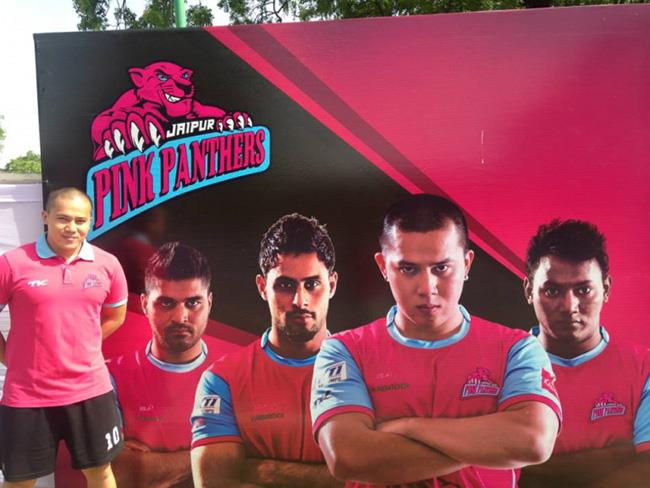
威暘 – PKL第三季粉紅豹隊的隊員 威暘提供

佳偉 – PKL第四季粉紅豹隊的隊員 羅佳偉提供
當威暘跟我分享這番話時,正值臺灣剛剛跟巴拿馬斷交,媒體上也討論著臺灣被孤立的狀況,在國際體壇上,同樣地,臺灣常處於一個被動的位置。以代表隊稱號來說,他們不能以「中華民國」或「臺灣」參與國際賽事,只能以「中華臺北」,2008 年北京奧運,甚至被主辦國建議稱為「中國臺北」(Bairner and Hwang 2010),在種種原因之下,很多運動員都會覺得臺灣在國際體壇上常站在一個較邊緣的位置。
事實上,2016年10月,印度舉辦卡巴迪世界盃,亞洲受邀參與的隊伍只有日本、南韓、泰國和孟加拉,臺灣不在名單之上,而整個賽事共有 12 隊參與,當我跟很多臺灣卡巴迪運動員交流的時候,他們也同意如果臺灣能參賽,以他們的實力,很大機會能打入準決賽,問鼎前四。
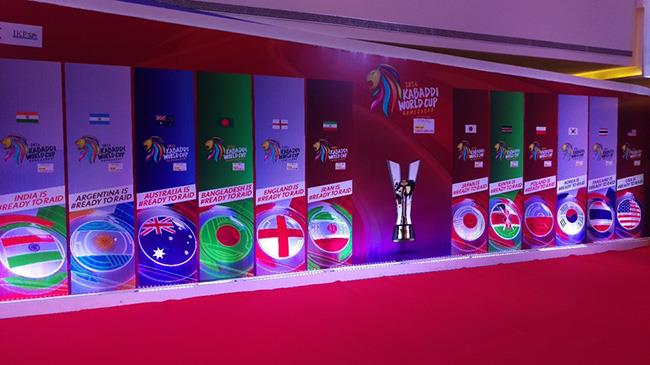
2016年卡巴迪世界盃參與的12支隊伍。
「卡巴迪是……」
佳偉是另一名資深的卡巴迪成員,當我問到他對臺灣的卡巴迪發展有什麼期望,他顯得一臉無奈:
「卡巴迪的一個特色就是你從來不知道何時會有國際賽事,以其他運動來說,它們的亞洲錦標賽或世界盃都會有一個固定的時間表,但卡巴迪就很難說……」
卡巴迪的國際比賽主要是由國際卡巴迪總會負責,然而,印度在總會有很大的影響力,常帶來一些不穩定因素。2017 年 3 月,我第一次探訪臺灣卡巴迪成員,那時他們正為幾個月後在伊朗舉辦的亞洲錦標賽作密集訓練,而在 4 月的時候,賽事宣佈取消,對運動員來說,臨時取消賽事,理應感到非常失望,但對臺灣卡巴迪運動員來說,他們說是司空見慣,因這並非第一次。
在這樣苦無機會參與國際賽事的情形下,驅使我很想知道他們何以有動力繼續參與這個運動。
2017 年 6 月,我有機會跟威暘和他的弟弟謹韓到新竹探訪玄奘大學的卡巴迪隊伍,這卡巴迪隊伍是第一隊能以非體保生為骨幹成員而奪全國冠軍的隊伍,訓練過後,我們一起到快炒店,喝啤酒,吃小菜,晚宴中,大家笑聲不斷,主題圍繞著 2013 年一起參與亞青培訓隊的訓練經過,謹韓憶述說:
「那時天氣很炎熱,訓練要跑很長的路程,共 10 公里……我們每天早上也期盼雨天來臨,取消訓練……有一次在賽道上,隱約看見賽道旁的樹林有一隻很大的狗……」謹韓比劃著那隻狗,大概有他的身驅這麼大,同桌的也紛紛點頭,笑著和應。「我不斷叫其他隊友,不要望,不要望,繼續跑,繼續跑……」
那次集訓,他們過著同樣的生活節奏,一起的增重、一起的鍛鍊肌肉和體能,付出很大的努力,但最終亞青錦標賽也告取消。
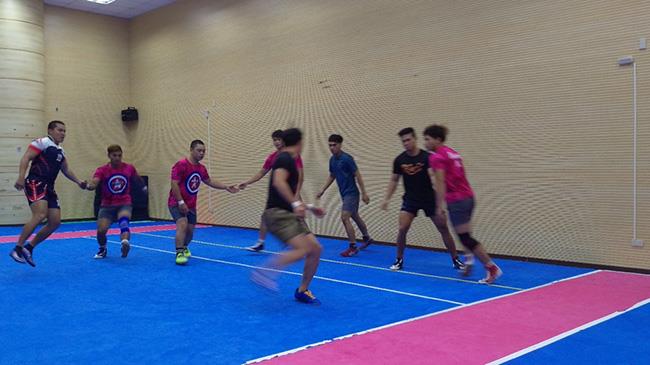
玄奘大學的卡巴迪隊伍正進行訓練。
卡巴迪是生活與生命上的相連
卡巴迪在臺灣十年間從無到有,運動員從充滿希望到失望,最後學習處之泰然。過程中,運動員不單學習了卡巴迪的技術,也建立了同樣的生活節奏和生命脈搏。
於花蓮的訓練營當中,有機會跟幾位高中女運動員訪談,問她們何以參加卡巴迪,其中一位說:「為國爭光!」其他成員立即討論:「臺灣是國家嗎?」「不這樣說,該怎麼說?」然而有一位運動員說:「我希望為我的高中帶來一點回憶。」
人類學過去的研究經常指出,「親屬關係」(kinship)並非建立於血緣關係之上,而是建立於生活節奏和情感分享,卡巴迪在臺灣的特殊處景,使運動員有著同樣的生活節奏和生命脈搏,大家情同手足。
玄奘大學的卡巴迪隊伍,於 2016 年奪得全國冠軍後,寫了一份名為「不斷失敗,不斷前進:我們的卡巴迪冠軍夢」的報告書,報告最後部份是運動員的個人分享,其中一位說:
「卡巴迪是一個讓人覺得很可怕的運動,但實際上我不那麼認為,因為這個運動讓我清楚了解到一旦牽了夥伴的手就放不開的一種又愛又恨的運動……」
防守的時候,卡巴迪運動員需要手握著隊友的手腕,並一起捉拿進攻者,於我觀察,這種相連,對臺灣卡巴迪運動員來說,實在不只肢體上,更多是生活上和生命上的相連。
備註:如欲了解更多臺灣的卡巴迪運動,可留意 2017 年 10 月臺灣的全國運動會,這是卡巴迪第一次成為全運會的正式項目。
參考文獻
1. Bairner, Alan, and Dong-Jhy Hwang. 2010. “Representing Taiwan: International Sport, Ethnicity and National Identity in the Republic of China.” International Review for the Sociology of Sport 46(3)231-248.
2. Chiang, Ying, Alan Bairner, Dong-Jhy Hwang, and Tzu-husan Chen. 2015. “Multiple Margins: Sport, Gender and Nationalism in Taiwan.” Asia Pacific Journal of Sport and Social Science 4(1)19-33.
3. Yu, J.W. and Alan Bairner. 2011. “The Confucian Legacy and its Implications for Physical Education in Taiwan.” European Physical Education Review 17(2):219-230.
2. Chiang, Ying, Alan Bairner, Dong-Jhy Hwang, and Tzu-husan Chen. 2015. “Multiple Margins: Sport, Gender and Nationalism in Taiwan.” Asia Pacific Journal of Sport and Social Science 4(1)19-33.
3. Yu, J.W. and Alan Bairner. 2011. “The Confucian Legacy and its Implications for Physical Education in Taiwan.” European Physical Education Review 17(2):219-230.
作者、圖片提供/鄧偉文(香港中文大學未來城市研究所博士後研究員)
責任編輯/Oliver Wu


運動星球
Strong Girls 姊妹無敵!Selena 首波聯名新品 SG X PUMA
2018-12-06
全球運動時尚指標 PUMA 近年來積極網羅引領全球時尚潮流的頂尖名人,接續推出的聯名商品更在運動時尚圈造成轟動迴響。自 2017 年,身兼歌手、演員及製作人的全球超人氣小天后賽琳娜․戈梅茲(Selena Gomez)正式成為 PUMA Family 的一員,身為次世代年輕族群的時尚 ICON,只要是 Selena 身上穿的服裝、腳下踩的鞋款,一經曝光就瞬間成為全球社群熱搜焦點,Selena 無所「畏」的新女力時尚魅力堪稱無敵,更讓粉絲們紛紛引領期待小天后與 PUMA 攜手合作的聯名火花。2018 年歲末假期將至,PUMA 今天特別獻上聖誕大禮,將於 12 月 12 日全球同步發行 SG X PUMA 首波全系列聯名大作,以「Strong Girl」無畏女孩的新女力態度為設計 DNA,為全球女孩披上自信綵衣,閃耀由內而外勇敢無懼的 SG X PUMA 美麗風采。

Strong Girls 姊妹無敵!Selena 首波聯名新品 SG X PUMA
賽琳娜․戈梅茲(Selena Gomez)首度與 PUMA 聯手打造 SG X PUMA 新女力全系列商品,SG 不僅代表 Selena Gomez 的名字縮寫,同時也象徵 「Strong Girl」無畏女孩的強悍新女力態度,她們對世界充滿熱情,勇於表達分享自身體驗,她們富有同情心但決不輕易妥協。Selena 認為現代女孩最需要的特質就是力量,故將無畏女孩的堅強鬥志幻化為時尚元素,與 PUMA 一同為全球女孩們打造獨一無二的女力單品,用自信色彩輔以大膽剪裁設計,讓女孩們由內而外自信脫穎而出,結合運動與時尚兩大經典元素,完美凸顯無畏女孩的多重面貌。身為 SG X PUMA 設計總監的 Selena 無疑是現代無畏女孩的最佳代表,她勇於面對各方挑戰,是一個外型可愛但內心力量卻無比強大的勇敢女孩,她道出了她創作背後的靈感啟發:「我每天都渴望能擁有“力量“,我想創造一個讓女孩們能盡情演繹性感、展現力量、發揮強大潛能的系列創作,我非常喜歡我所設計的每一件作品,我希望透過這些單品來激發大家內心深處的那個無畏女孩。」

PUMA 女力大使Selena Gomez
全新 SG X PUMA 聯名系列由女孩心中的無畏初衷出發,闡述女孩們透過不同的情緒轉折和面對挑戰的心路歷程,將心境體現在鞋履分層、混合與搭配設計上。而此番 SG X PUMA 聯名鞋款中最耀眼的堪稱這雙 SG Runner,從設計到製造皆是出自於 Selena 之手,鞋型完美融合了 Selena 個人時尚風格和 PUMA 經典慢跑鞋設計,超輕量回彈的 EVA 大底搭配細膩針織鞋面,打造輕盈質感及絕佳合腳舒適性,巧妙將 80、90 年代的加州復古風格導入鞋身設計,自信展現好萊塢女孩追求夢想的熱情無畏;另外,今年時尚女孩的必備鞋款 DEFY Mid X SG,中筒訓練鞋型加以黑色金屬扣鉤、玫瑰金鍊、與紋理針織鞋面三大元素打造而成,燦爛耀眼的微奢華風格令女孩們驚呼尖叫。
除了鞋款外,SG X PUMA 聯名系列服飾與配件的創作發想也皆延伸於 Selena 的個人風格及時尚品味,以她私下鍾愛的黑色、白色、與灰色為主色調,除了滿足女孩們在跑步與訓練的運動舒適需求外,更兼具讓人為之一亮的時尚巧思,在 Strong Girl 的主題包裝下,Selena 除了用大膽圖樣與剪裁來彰顯無畏的新女力態度外,也精心將許多鼓舞人心的姊妹們激勵對話隱藏在系列單品細節中。SG X PUMA 側開岔長褲使用不敗時尚超寬褲剪裁,側邊排釦開岔在展現霸氣的同時也小露性感、SG X PUMA 連帽外套看似極簡俐落,背後刺繡豹頭玫瑰圖騰大膽翻轉形象,正如同無畏女孩在柔美外表下潛藏無比強大的女力能量。

SG X PUMA
Strong Girl SG X PUMA 聯名時尚女力系列由漂亮寶貝 Selena Gomez 親身領軍強大女力團隊共同完成,藝術家 Dana Veraldi(@danaveraldi)透過插圖創作為 SG X PUMA 首波形象曝光增添更多視覺亮點;而知名攝影師 Katie McCurdy(@katiemccurdy_)則透過她獨到的攝影天份與視角將 SG X PUMA 所要傳遞的 Strong Girl 精神巧妙具體化,致敬她內心的強大女孩。Selena Gomez 身邊的閨密團更是功不可沒,這些無畏女孩們互相扶持傾訴,在 SG X PUMA 首波形象拍攝中 Selena 也邀請她的姊妹閨蜜們共同入鏡拍攝:Connar Franklin(@connarfranklin)、Raquelle Stevens(@raquellestevens)、Courtney J. Barry(@courtneyjbarry)、Caroline Franklin(@caro_franklin)與 Theresa Marie Mingus(@ tmarie247),Selena 感性地說到:「如果沒有她們,我今天不會有機會站在這裡。Strong Girl 除了闡述新女力的特質外,更是傳遞姊妹無敵的能量。」

Strong Girls 姊妹無敵 漂亮寶貝 Selena 首波聯名新品 SG X PUMA
PUMA 與漂亮寶貝 Selena Gomez 首度攜手聯名 Strong Girl SG X PUMA 時尚女力系列新品,將於 12 月 12 日全球同步於指定 PUMA 門市限定發售。全台無畏女孩站出來,與姊妹們一起展現妳們獨一無二的次世代女力自信風采。
資料來源/PUMA
責任編輯/妞妞

運動星球
2017臺北世大運開幕盛典驚豔絕倫 用年輕創意贏得喝采
2017-08-20
全球141個代表團 共7700名選手參與開幕盛會
眾所矚目、臺灣有史以來最大國際體育盛事─2017臺北世界大學運動會昨(19)日晚間7時,於臺北田徑場正式揭開序幕,以國際視野、臺灣特色與年輕主張三大創意重點為出發,在近3小時的節目中,包含正式儀典及別出心裁的文化節目,讓全球141個代表團、進場的7700名選手,及現場近19,000名觀眾,感受臺灣的熱情與創意,同時透過轉播,讓全世界看見臺灣的活力。
開幕典禮序曲以歡慶世大運揭開序幕,充滿活力與多元文化的臺北熱情地向世界展開雙手,歡迎遠道而來各國青年運動員。接著由「活力島嶼」揭開動人篇章,「島嶼生成」從臺灣原生樣態,搭配四季流轉,孕育多元的生態與文化,透過王翔如、桑布伊等原住民嘹亮美聲,詮釋「生命禮讚」,本章節中特別強調「變」的特質,視屏呈現也搭配版畫藝術家伊誕.巴瓦瓦隆的紋砌刻畫作品,呼應同心圓的融合,運用一圈圈的圓構築這片土地、大地,以及持續流轉的生命,舞者身著充滿想像力的創新編織圖騰,伴隨著燈光幻化,開啟壯麗史詩。「繽紛島嶼」匯聚臺灣客家族群、閩南族群以及民俗、戲曲融合,表現華人文化中囍慶辦桌,為賽事祈福。
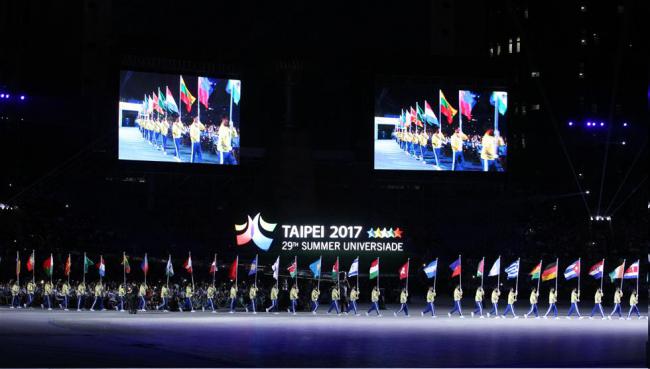
2017臺北世大運共有141個代表團參加。
緊扣世大運主題For You.For Youth精神 表演高潮迭起
開幕文化節目內容上,緊扣世大運主題For You.For Youth的精神,由跨領域新生代編創設計團隊呈現,以臺灣島嶼的過去、現在及未來為演出主軸,運用翻轉、跨界、重組,透過跨產業、跨領域的創新組合,融合在地文化並連結國際。臺灣原生多元文化的「活力島嶼」,聚焦飆颯感十足的「匯聚臺北」,再轉換邁入數位時代,展現臺灣與世界不可分的互動連結「世界部落」的三段文化節目,由來自18所藝術表演專業學校系所,42個專業表演團隊,超過2,500名的各界表演者共同參與,整體演出及工作人員更高達3,800位。首次運用1,200平方公尺LED地屏螢幕作為演出舞台,搭配離地22公尺,可吊重12噸的空中懸吊系統,透過聲音、高空演出、舞蹈及多媒體的巧妙呼應搭配,呈現三度空間的立體展演,為2017臺北世大運留下經典畫面。
開幕儀式上由首位奪牌的女性運動員紀政,帶領跨越老中青三代獲獎運動員,擔任中華臺北會旗的護旗手,並由在世界各地造福人群的國際志工擔任升旗手,在臺北世大運組織委員會主任委員臺北市長柯文哲,及國際大學運動總會會長Oleg Matytsin致詞後,由總統蔡英文宣告,2017臺北世界大學運動會正式開始,曾於國際大型賽事奪得卓越成績的蘇麗文、陳立昕等人則擔任國際大學運動總會的護旗手。
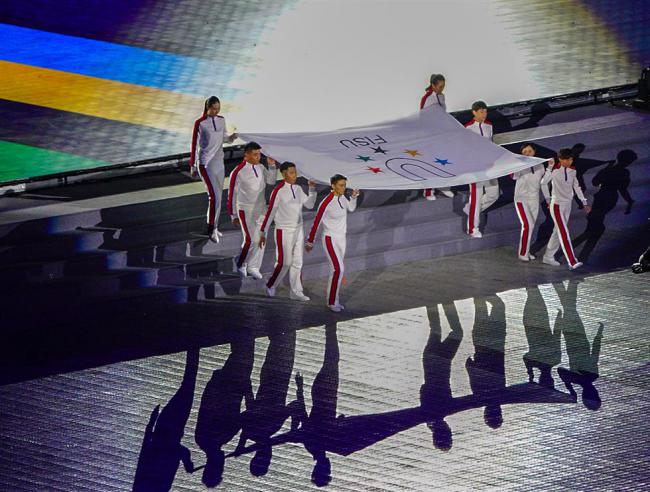
曾於國際大型賽事奪得卓越成績的蘇麗文、陳立昕等人則擔任國際大學運動總會(FISU)會旗的護旗手。
棒壇傳奇陳金鋒 感動揮棒傳遞聖火
第二段文化節目「匯聚臺北」以主辦城市臺北為主軸,強調當代臺北的融合、混搭、多元、大膽,從表演者翻越穿梭於五顏六色的屋頂景觀,夜市閃爍的美食攤車,透過肢體動能及服裝趣味呈現翻轉中的重新組合,由敬天祈福的煙舞、祭神也祭民的飲食,到大火快炒與吶喊民主的分貝競速、旗幟飄揚,穿越臺北新與舊的天際線,傳統與現代不斷交錯對話,拼貼創意造就出這座城市的生猛有力,透過Boxing樂團與歌手A-Lin接力演出,臺灣之光Gogoro衝衝衝,絢麗歡騰的盛大遶境,這就是臺北,從發展、改造到翻轉,構築信仰、民主,同時結合生活,透過煙霧、空拍影像、臺北氣味、以及高彩度畫面充分表達這城市的繽紛艷麗。
「世界部落」則呈現邁入數位時代,臺灣與世界不可分的互動連結,透過晶圓、科技等未來光感、雷射與數位的時代演繹,透過科技連結全球。由國際小提琴大賽常勝軍曾宇謙的優美旋律帶動下,晶圓面板串連出世界知名的「交通號誌小綠人」,矩陣排列中美國知名舞團客座首席舞者簡珮如現身,以卓越舞姿串起點、線、面的全球網絡。接著由音樂才子王力宏接力演出全新創作,並透過DJ APP,與現場觀眾的互動合奏,將現代人生活中不可或缺的手持裝置轉換為演出樂器,運用音樂傳遞多人共享、無遠弗界的年輕創意,融合科技、群眾的互動概念,突破網路與實體的疆界,達到音樂與情感串流,與舞者們共振共舞,透過活力運動場讓臺灣與世界連結,傳達這場世大運開幕式最重要的訊息- for you for youth。
臺北世大運開幕的另一高潮是點燃聖火。聖火台以象徵稻穗豐收的基座,搭配藝術家以竹編結合「搖曳生姿」的動態精密機械聖火台,由3名火炬手江宏傑(桌球)、戴資穎(羽球)、譚雅婷(射箭),分別以繞場方式傳遞聖火,「永遠的第四棒」—棒壇傳奇陳金鋒,以全球首創的揮出全壘打方式、點亮臺北世大運聖火台!當陳金鋒揮出火球,「catch the moment」點燃的聖火台,宛若巨手高舉聖火,同步引發歡慶煙火!煙火由跨國團隊首度結合了地景概念、特效技術,再融入城市地標特色,瞬間閃耀天際,震撼全場觀眾,點亮臺北夜空,2017臺北世界大學運動會開幕式,完美呈現。

大會聖火傳遞由棒壇傳奇人物陳金鋒以揮棒擊出全壘打方式將火苗打上聖火台。

